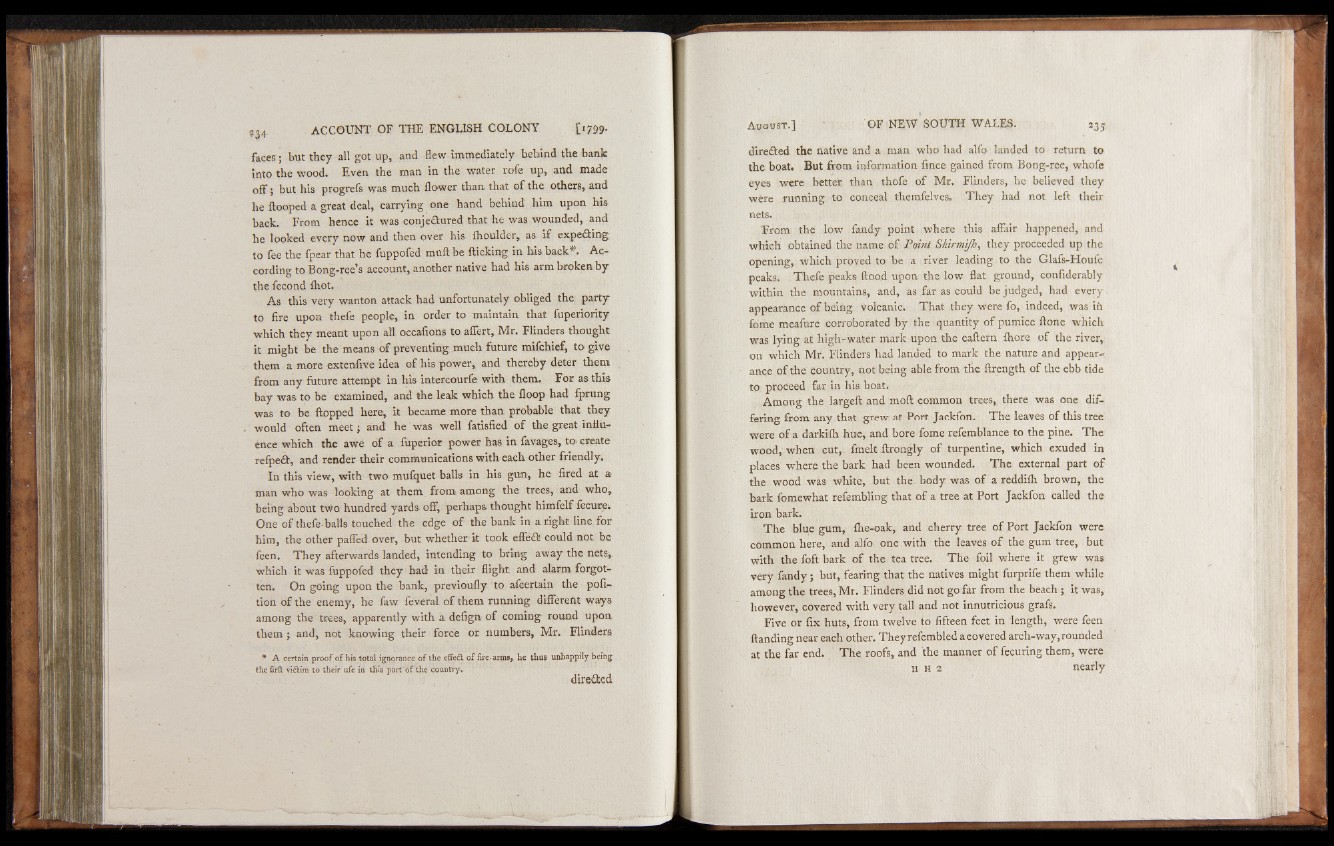
?34
faces ; but they all got up, and flew immediately behind the bank
into the wood. Even the man in the water role up, and made
o f f ; but his progrefs was much flower than, that of the others, and
he Hooped a great deal, carrying one hand behind him upon his
back. From hence it was conje£tured that he was wounded, and
he looked every now and then over his fhoulder, as i f expecting
to fee the fpear that he fuppofed mull be flicking in his back*. According
to Bong-ree’s account, another native had his arm broken-by
the fecond fhot.
As this very wanton attack had unfortunately obliged the party
to fire upon thefe people, in order to maintain that fuperiority
which they meant upon all occafions to alfert, Mr. Flinders thought
it might be the means of preventing much future mifehief, to give
them a more extenfive idea of his power, and thereby deter them
from any future attempt in his intercourle with them. For as this
bay was to be examined, and the leak which the floop had fprung
was to be flopped here, it became more than probable that they
would often meet; and he was well fatisfied o f the great influence
which the awe o f a fuperior power has in favages, to create
refpedt, and render their communications with each other friendly.
In this view, with two mufquet balls in his gun, he fired at a
man who was looking at them from among the trees, and who,
being about two hundred yards off, perhaps thought himfelf fecure.
One o f thefe balls touched the edge o f the bank in a right line for
him, the other palled over, but whether' it took efleet could not be
feen. They afterwards landed, intending to bring away the nets,
which it was fuppofed they had in their flight and alarm forgotten.
On going upon the bank, previoufly to afeertain the pofi-
tion of the enemy, he faw feveral of them running different ways
among the trees, apparently with a defign o f coming round upon
them ; and, not knowing their force or numbers, Mr. Flinders
* A .certain proof o f his total ignorance o f the effeft of fire-arms,, he thus unhappily being
the firft viftim to their life in this part 'of the country .
direfled
directed the native and a man who had alfo landed to return to
the boat. But from information fince gained from Bong-ree, whofe
eyes were better than thofe of Mr, Flinders, he believed they
were running to conceal themfelves. They had not left their
nets.
‘From the low fandy point where this affair happened, and
which obtained the name o f Point Skirmijh, they proceeded up the
opening, which proved to be a river leading to the Glafs-Houfe
peaks. Thefe peaks flood upon the low flat ground, confiderably
within the mountains, and, as far as could be judged, had every
appearance o f being volcanic. That they were fo, indeed, was in
fome meafure corroborated by the quantity of pumice ftone which
was lying at high-water mark upon the eaftern fhore of the river,
on which Mf. Flinders had landed to mark the nature and appearance
of the country, not being able from the ftrength o f the ebb tide
to proceed far in his boat.
Among the largeft and moft common trees, there was one differing
from any that grew at Port Jackfon. The leaves of this tree
were o f a darkilh hue, and bore fome refemblance to the pine. The
wood, when cut, fmelt ftrongly o f turpentine, which exuded in
places where the bark had been wounded. The external part of
the wood was white, but the body was o f a reddilh brown, the
bark fomewhat refembling that o f a tree at Port Jackfon called the
iron bark.
The blue gum, fhe-oak, and cherry tree o f Port Jackfon were
common here, and alfo one with the leaves o f the gum tree, but
with the foft bark o f the tea tree. The foil where it grew was
very fandy; but, fearing that the natives might furprife them while
among the trees, M r. Flinders did not go far from the beach ; it was,
however, covered with very tall and not innutricious grafs.
Five or fix huts, from twelve fo fifteen feet in length, were feen
ftanding near each other. They refembled acovered arch-way,rounded
at the far end. The roofs, and the manner o f fecuring them, were
H H 2 nearly